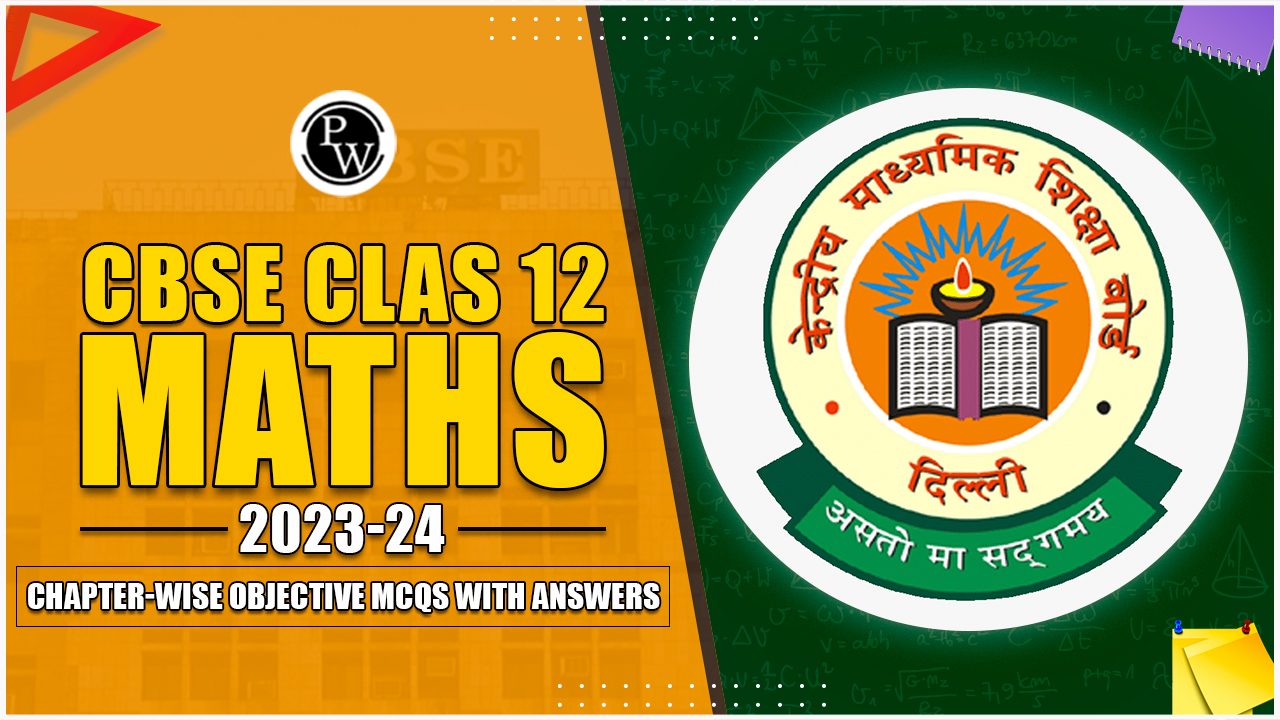CBSE Class 12 Maths 2023-24 Syllabus, Exam Pattern, Question Paper Design

CBSE Class 12 Maths 2023-24: The CBSE Class 12 Maths 2023-2024 Exam is scheduled for March 10, 2024. The exam will last for three hours and will take place in one continuous session. It will be conducted in all schools affiliated with the CBSE throughout India. The CBSE Class 12 Maths 2023-2024 examination in India holds significant importance in the educational journey of students.
This is a very challenging and important exam and greatly influences their future academic and career opportunities. Success in the CBSE Class 12 Mathematics exam depends on comprehensive preparation, a strong understanding of mathematical principles, and consistent practice. This article has all the information about the CBSE Class 12 Maths 2023-2024 exam.
CBSE Class 12 Maths 2023-24 Overview
The CBSE Class 12 Maths 2023-2024 exam conducted by the Central Board of Secondary Education (CBSE) is a crucial point in the academic journey of Indian students. CBSE is a well-known educational board in India, and the Class 12 Mathematics exam is critical to students pursuing various streams, including science and commerce. The CBSE Class 12 Mathematics exam follows a written format and is primarily theory-based. It comprises two papers: Paper I and Paper II. Paper I is compulsory, while Paper II offers choices to students. Check the table below for more details:
Recommended Books for CBSE Board Class 12th:
- CBSE 15 Sample Question Papers Class 12 Chemistry
- CBSE 15 Sample Question Papers Class 12 Physics, Chemistry, Mathematics for 2024 Exam
- CBSE 15 Sample Question Papers Class 12 Physics, Chemistry, Biology for 2024 Exam
CBSE Class 12 Maths 2023-2024 Overview
| Particulars | Details |
| Board of Examination | Central Board of Secondary Examination (CBSE) |
| Exam Mode | Offline |
| Subject | Mathematics |
| Paper | Maths Standard and Maths Basic |
| Medium | English and Hindi |
| Duration | 3 Hours |
| Total Marks | 100 |
| Theory Paper | 80 Marks |
| Internal Assessment | 20 Marks |
Also Read: CBSE Board Exams 2024
CBSE Class 12 Maths 2023-24 Syllabus
The Mathematics syllabus at the senior secondary level has evolved over time to align with the subject's growth and the changing demands of society. This stage serves as a foundation for students pursuing further academic studies in Mathematics or opting for professional courses in fields such as Engineering, Physical and Biological Sciences, Commerce, or Computer Applications.
The current revised curriculum has been developed in line with the National Curriculum Framework of 2005 and the recommendations provided by the Focus Group on Teaching of Mathematics in 2005. It aims to cater to the diverse needs of all types of students. To achieve this, there is a stronger emphasis on connecting mathematical concepts to real-life situations and other academic domains, encouraging the practical application of various principles. Check the table below for more details:
CBSE Class 12 Maths 2023-24 Syllabus:
| Unit No. | Syllabus |
| Unit-I: Relations and Functions |
Relations and Functions (15 Periods) Exploring various types of relations: reflexive, symmetric, transitive, and equivalence relations. Understanding one-to-one and onto functions. Inverse Trigonometric Functions (15 Periods) Examining the definition, range, domain, and principal value branch of inverse trigonometric functions. Studying the graphs of inverse trigonometric functions. |
| Unit-II: Algebra |
Matrices (25 Periods) Covering concepts, notations, matrix orders, matrix types, zero and identity matrices, matrix transposition, symmetric and skew-symmetric matrices. Performing operations on matrices, including addition and multiplication, as well as scalar multiplication. Exploring basic properties of matrix operations and discussing the non-commutativity of matrix multiplication. Investigating invertible matrices and the uniqueness of their inverses, provided they exist (all matrices considered will have real entries). Determinants (25 Periods) Understanding the determinant of a square matrix, minors, co-factors, and their applications in calculating the area of a triangle. Exploring the adjoint and inverse of a square matrix. Solving systems of linear equations by considering consistency, inconsistency, and the number of solutions, with a focus on examples. Demonstrating the solution of systems of linear equations in two or three variables that have a unique solution using matrix inverses. |
| Unit-III: Calculus |
Continuity and Differentiability (20 Periods) Exploring the concepts of continuity and differentiability, the chain rule, and derivatives of inverse trigonometric functions, such as sin⁻¹x, cos⁻¹x, and tan⁻¹x. Calculating derivatives of implicit functions and introducing the concepts of exponential and logarithmic functions. Computing derivatives of logarithmic and exponential functions, as well as discussing logarithmic differentiation and second-order derivatives. Applications of Derivatives (10 Periods) Investigating practical applications of derivatives, including analysing rates of change in quantities, identifying increasing and decreasing functions, and determining maxima and minima. The first derivative test is motivated geometrically, and the second derivative test is introduced as a provable tool. Examining simple problems that illustrate fundamental principles and their real-life relevance. Integrals (20 Periods) Understanding integration as the inverse process of differentiation. Demonstrating the integration of various functions using methods such as substitution, partial fractions, and integration by parts. Evaluating simple integrals of different types and solving problems based on these integrals. Introducing the Fundamental Theorem of Calculus (without proof) and discussing basic properties of definite integrals, as well as techniques for evaluating definite integrals. Applications of Integrals (15 Periods) Applying integrals to find the area under simple curves, particularly lines, circles, parabolas, and ellipses (in standard form). Differential Equations (15 Periods) Discussing the definition, order, and degree of differential equations. Analysing general and particular solutions of differential equations. Solving differential equations using the method of separation of variables and examining solutions of homogeneous differential equations of the first order and first degree. |
| Unit-IV: Vectors and Three-Dimensional Geometry |
Vectors (15 Periods) Differentiating between vectors and scalars, understanding vector magnitude and direction. Defining direction cosines and direction ratios of a vector. Discussing different types of vectors, such as equal, unit, zero, parallel, and collinear vectors. Examining the position vector of a point, negation of a vector, vector components, vector addition, scalar multiplication of vectors, and the position vector of a point dividing a line segment in a given ratio. Introducing the scalar (dot) product of vectors, along with its definition, geometrical interpretation, properties, and applications. Also, exploring the vector (cross) product of vectors. Three-Dimensional Geometry (15 Periods) Investigating direction cosines, direction ratios of a line joining two points, and the Cartesian equation and vector equation of a line. Analysing skew lines, determining the shortest distance between two lines, and calculating the angle between two lines. |
| Unit-V: Linear Programming |
Linear Programming (20 Periods) Providing an introduction to linear programming and introducing related terminology, including constraints, objective functions, optimization, and graphical methods for solving problems in two variables. Examining feasible and infeasible regions (whether bounded or unbounded), feasible and infeasible solutions, and optimal feasible solutions (limited to cases with up to three non-trivial constraints). |
| Unit-VI: Probability |
Probability (30 Periods) Discussing conditional probability, the multiplication theorem on probability, independent events, total probability, Bayes' theorem, random variables, and probability distributions. Also, exploring the concept of the mean of a random variable. |
Also Read: Latest CBSE Sample Papers for Class 10 All Subjects
CBSE Class 12 Maths 2023-24 Question Paper Design
The design of the CBSE Class 12 Mathematics 2023-24 question paper will align with the updated syllabus introduced by the CBSE in March 2023. This revised syllabus focuses on evaluating students' grasp of concepts and their problem-solving abilities.
The question paper will encompass key subject matter from the syllabus, aiming to assess students' comprehension of the principles, their aptitude for applying them to address challenges, and their capacity for critical and innovative thinking. Check the table below for more details:
CBSE Class 12 Maths 2023-24 Question Paper Design
| Sl.No. | Typology of Questions | Total Marks | %Weightage |
| 1 |
Remembering: Recalling what you've learned, like facts, words, basic ideas, and answers. Understanding: Showing you get the facts and ideas by organising, comparing, explaining, and stating the main points. |
44 | 55 |
| 2 | Applying: Using what you know to solve problems in different situations. | 20 | 25 |
| 3 |
Analysing: Breaking down information into parts, finding reasons, making educated guesses, and finding proof to support general ideas. Evaluating: Sharing and defending your thoughts by making judgments about information, the strength of ideas, or the quality of work based on certain criteria. Creating: Putting information together in a new way by mixing parts into a fresh pattern or suggesting new solutions. |
16 | 20 |
| Total | 80 | 100 |
Choice(s)
-
There will be no overall choice in your question paper.
-
However, 33% internal choices will be provided in all the sections
Conducting Periodic Tests
Periodic assessments are paper-based tests administered by the respective subject teachers. The format of these tests should include a well-balanced mix of question types, including very short answer (VSA), short answer (SA), and long answer (LA) questions. This diversity in question types allows for a comprehensive evaluation of students' knowledge, understanding, application, skills, analysis, evaluation, and synthesis. Depending on the subject's nature, subject teachers may also include other question types. Here are the details of the periodic tests:
a) Mode
The periodic tests are to be administered in a traditional pen-and-paper format.
b) Schedule
Throughout the academic year, each subject may have three periodic tests, as follows:
-
Pre Mid-term (PT-I): Tentative months - July-August
-
Mid-Term (PT-II): Tentative month - November
-
Post Mid-term (PT-III): Tentative months - December-January
Please note that this schedule is suggestive, and schools have the flexibility to adjust it to their convenience. Schools with winter sessions should design their schedules while maintaining a similar time gap between consecutive tests.
c) Average of Marks
After conducting all three periodic tests, schools will convert the weightage of each test into ten marks each. The two test marks will be considered, and their average will be the final marks for the periodic test.
d) Documentation
Schools should maintain simple documentation to record students' performance, as specified in circular no. Acad-05/2017.
e) Sharing of Feedback/Performance
Students' performance in each test should be shared with both students and their parents. This feedback provides an overview of the learning progress during different periods. It is recommended that teachers share exemplary student performance with the class to motivate all learners. When sharing feedback, teachers should adopt an empathetic, non-judgmental, and motivating approach.
Assessment of Activity Work
Throughout the academic year, students are required to complete ten activities from the NCERT Laboratory Manual specific to their class (XI or XII). A record of these activities should be maintained by the student. Additionally, a year-end test on one of these activities may be conducted, with the following weightage:
-
Activities performed throughout the year and record keeping: 5 marks
-
Assessment of the activity performed during the year-end test: 3 marks
-
Viva-voce (oral examination): 2 marks
CBSE Class 12 Maths 2023-24 Question Paper Exam Pattern
The question paper is divided into five sections, namely A, B, C, D, and E. Each of these sections is mandatory, although certain questions within them offer internal choices.
-
In Section A, you will find 18 multiple-choice questions (MCQs) and 2 Assertion-Reason based questions, each worth 1 mark.
-
Section B consists of 5 Very Short Answer (VSA) questions, each valued at 2 marks.
-
Section C contains 6 Short Answer (SA) questions, each carrying 3 marks.
-
Section D comprises 4 Long Answer (LA) questions, and each question is worth 5 marks.
-
In Section E, you will encounter 3 source-based, case-based, or passage-based units of assessment, each with a total of 4 marks and subparts.
-
You have a total of 3 hours to complete the exam, which is graded out of 80 marks.
CBSE Class 12 Maths 2023-24 Question Paper Exam Pattern:
| No. | Units | Marks |
| 1 | Relations and Functions | 08 |
| 2 | Algebra | 10 |
| 3 | Calculus | 35 |
| 4 | Vectors and Three–Dimensional Geometry | 14 |
| 5 | Linear Programming | 05 |
| 6 | Probability | 08 |
| Total Theory | 80 | |
| Internal Assessment | 20 | |
| Grand Total | 100 |
CBSE Class 12 Maths 2023-24 Sample Paper With Solutions
The Central Board of Secondary Education (CBSE) has made accessible the sample question papers and marking schemes for the 2023-2024 academic year for all subjects across various streams, aimed at aiding students in their preparations for the upcoming 2024 board exams. CBSE traditionally releases these sample papers and marking schemes for 12th-grade students, offering valuable insights into the evaluation criteria.
In this section, you can find a comprehensive collection of subject-specific sample papers and their corresponding solutions and marking schemes provided by the CBSE Board. These CBSE Class 12 Sample Papers for the 2023-24 academic year, in conjunction with the additional practice questions, are invaluable resources to enhance your readiness for the CBSE Class 12 Board exams in 2023-24.
CBSE Class 12 Maths 2023-24 Admit Card Steps to Download
The CBSE Class 12 Maths 2023-2024 admit card for the upcoming exams is typically released by the board approximately one to two weeks before the examinations commence. School authorities have the privilege of downloading the admit cards for regular students. Students must then visit their respective schools to obtain the admit cards, which require an official stamp and signature from the school authorities for validation. Here are the steps to download the CBSE Class 12 Maths 2023-2024 admit card:
-
Visit the official CBSE website at cbse.gov.in.
-
Navigate to the "Pariksha Sangam" tab and click on "Schools."
-
Choose the option labelled 'Admit Card/Centre Material for Examination 2023-24' under 'Pre Exam Activities.'
-
Log in using the school's user ID, password, and security pin.
-
The CBSE Class 12 admit card for 2024 will be displayed on the screen.
-
Download the admit card and print it on an A4 size paper.
Important Note: It is essential for students to ensure that the admit card is properly stamped and signed by their respective school authorities. An admit card without the school's endorsement will not be accepted as valid at the examination centre.
CBSE Class 12 Maths 2023-24 Preparation Tips
Preparing for the CBSE Class 12 Maths exam can be a challenging task, but with the right strategy and dedication, you can score well in this crucial subject. Mathematics is an important subject for students aspiring to pursue careers in science, engineering, and various other fields. Here are some valuable tips to help you prepare effectively for your CBSE Class 12 Maths 2023-24 exam:
-
Understand the Weightage: Start by thoroughly understanding the weightage of various topics in the CBSE Class 12 Maths syllabus. Focus more on chapters that carry higher marks, such as Calculus (Integration and Differentiation) and Linear Programming.
-
Solve Previous Year Papers: Begin your preparation by solving previous years' question papers. This will give you an idea of the exam pattern, the types of questions asked, and help you identify important topics.
-
Master the NCERT Textbook: The NCERT textbook is the foundation for CBSE exams. Ensure you understand each concept in depth. Practise the exercises and examples thoroughly, as many questions are directly based on them.
-
Practice RD Sharma and RS Aggarwal: While NCERT is essential, for more practice and variety, solve additional reference books like RD Sharma and RS Aggarwal. They have a wide range of problems that can help you grasp different problem-solving techniques.
-
Focus on NCERT Exemplar: Don't overlook the NCERT Exemplar problems. These questions are often more challenging and can help you develop a deeper understanding of the subject.
-
Use Online Resources: There are several websites, apps, and YouTube channels that offer video lessons and practice questions. Use these resources to clarify doubts and gain different perspectives on solving problems.
-
Maintain a Formula Notebook: Create a formula notebook with all the essential formulas, theorems, and properties in one place. Regularly revise these formulas to keep them fresh in your memory.
-
Mind Mapping for Concepts: Use mind maps or concept maps to connect different concepts and their applications. This can help you understand the subject holistically.
-
Group Study for Challenging Problems: Collaborate with peers for group study sessions, especially when dealing with complex problems. Discussing and solving problems together can lead to better understanding.
-
Regularly Review and Revise: Periodically review what you've learned. Revision is crucial in mathematics. Set aside time to revisit concepts and practice problems you've already solved.
-
Take Mock Tests: As the exam approaches, take full-length mock tests to simulate exam conditions. This will help you improve your time management and build your confidence.
CBSE Class 12 Maths 2023-24 FAQs
-
Is class 12 CBSE syllabus 2023-24 released?
Ans. No, the class 12 CBSE syllabus for 2023-24 has not been released yet. It is expected to be released in December 2023.
-
Is CBSE reduced syllabus 2023-24?
Ans. Yes, the CBSE has reduced the syllabus for 2023-24 by 30%. This is to reduce the burden on students due to the COVID-19 pandemic.
-
How many chapters are there in Maths class 12 2024?
Ans. There are 16 chapters in Maths class 12 for 2024.
-
Was Maths paper tough 2023 class 12?
Ans. The Maths paper for class 12 in 2023 was of moderate difficulty. Some students found it to be challenging, while others found it to be easy.
-
Can I take 7 subjects in class 12?
Ans. Yes, you can take 7 subjects in class 12. However, it is important to note that this will be a heavy workload. You should only take 7 subjects if you are confident that you can handle it.








